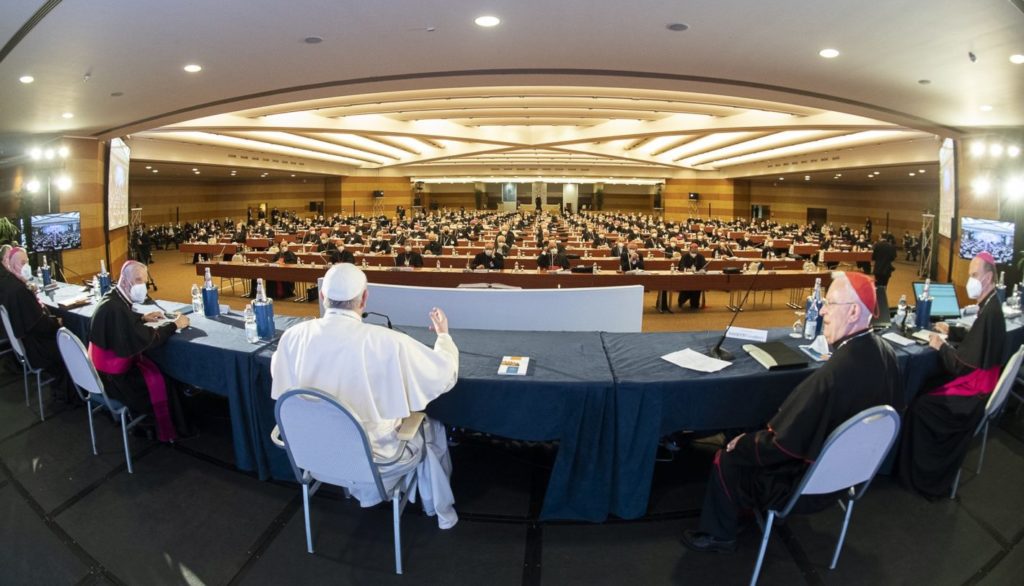There is an effervescence in the Church around a topic that very often excites more the "insiders" and protagonists than the whole faithful people. And yet it is a process, if we want to call it institutional, at the end of which opinions emerge on questions concerning the life of the Church in general and the state of evangelization in particular.
We speak, in case it was not understood, of those Assemblies that generally receive the name of Synod, which are held in various stages and with different cadences, both in the universal Church and in the particular Churches.
There are the Synods...
The best known are the Synods of Bishops generally convoked every two or three years by the Pope to reflect on matters of general interest in the Church (priesthood, catechesis, vocation of the laity, etc.), urgent or not, but also on particular aspects concerning, for example, a geographical area or a territory. The last one, for example, was on Amazonia, which generated the Apostolic Exhortation Dear Amazonia of Pope Francis.
The Code of Canon Law only attributes the name Synod to another type of assembly, which is that of the priests and other faithful of a diocese who meet to assist the bishop - and his convocation - in matters affecting that particular Church. It is not by chance that it is called "Diocesan Synod".
... and then the Synodal Pathways
In recent years and months, there has been much talk of another process that does not have a normative configuration, but rather arises from the experience - or the problems - of a given national territory, at the initiative of the bishops of those lands. Let us think, for example, of the "synodal path" - as we can see, a different name that does not configure the institution of the Synod properly speaking - that is taking place in Germany, and which is generating a very strong debate in the Church in general.
It is not the case to go into the specificities of this local path, and of the issues that are being addressed also with not a few polemics. Suffice it to recall what Pope Francis himself wrote exactly two years ago, on June 29, 2019, in a Letter to the people of God on pilgrimage in Germany.
Beware of temptations
On that occasion, the Pontiff invited us to beware of the possible temptations that can creep into our lives. synodal journeyAmong them is that of "thinking that, in the face of so many problems and shortcomings, the best response would be to reorganize things, to make changes and especially "patches" that would allow the life of the Church to be put in order and in harmony, adapting it to the present logic or that of a particular group".
The risk, on the other hand, would be to find ourselves with "a good ecclesial body, well organized and even 'modernized' but without evangelical soul and novelty; we would live a 'gaseous' Christianity without evangelical bite".
A Road to the Jubilee of 2025
A similar path is being pursued in Italy, even if the needs and problems are different from those in Germany. Here, for example, there is not an excessive distancing of the faithful from religious practice, but rather a certain stillness and a settling down that also leads to a loss of enthusiasm.
On several occasions, meeting with the bishops of the Italian Episcopal Conference, Pope Francis had urged this synodal journey, which would take up the historical and cultural roots of the country and rekindle in the people the joyful flame of a faith lived at the service of the common good, as it was for so many charismatic figures in past decades. Priests, committed lay people and politicians...
After several resistances, during the last General Assembly of the Italian Bishops, opened also by the presence of the Holy Father as in previous years, a "letter of intent" was signed on this synodal journey that should involve all the national dioceses for the next 4 years, until the Jubilee of 2025.
The first stage, in 2022, will concern the involvement of the people of God with moments of listening, research and proposals in the dioceses, parishes and ecclesial realities, "from the bottom up", as the Pontiff defined it. Then, in 2023, it will be the turn of the stage "from the periphery to the center", in which there will be a dialogue with all the expressions of Italian Catholicism. In 2024 there will be a synthesis of the road travelled and the delivery of shared pastoral guidelines, "from top to bottom". The Jubilee should be the occasion for a general verification of the process carried out.
A time of rebirth
The Italian bishops want to foresee a time of rebirth that passes through the recovery of the reading of the Words, of the eschatological aspect of the Christian faith, of catechesis lived as a path of ongoing formation, of a rediscovery of the value of the family, of solidarity, of charity and of civil commitment.
General participation will be necessary, but the journey has just begun. And many insights will surely emerge as we "walk".









